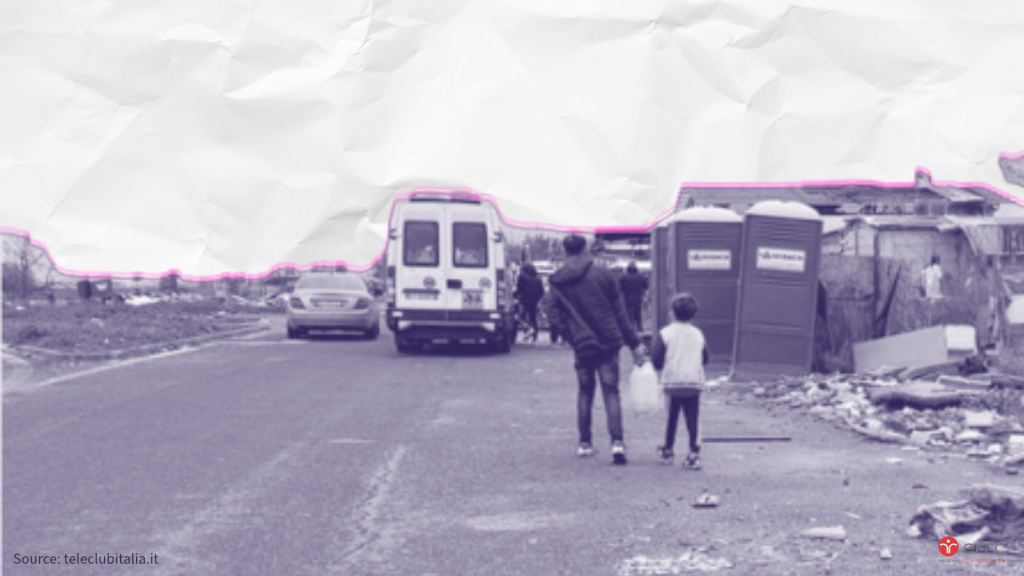Giugliano, Naples: the short life and sudden death of Michelle, a Romani child born in a camp
04 March 2024

The Saturday before she was due to start school, six-year-old Michelle died by electrocution in the Roma camp in Via Carrafiello di Giugliano in Naples. Despite desperate attempts to resuscitate the girl, who had brushed against exposed electrical cables, she was pronounced dead at about three p.m. on the 13 January 2024.
Allegedly, distressed family members caused a disturbance at the hospital and were accused of attacking health care personnel and police. This ‘chaos’ quickly became the focus of local media attention, and coverage of the tragic death of a child quickly morphed into an issue of public order and security.
Deputy Francesco Emilio Borrelli of the Alleanza Verdi Sinistra, weighed in by describing the Giugliano camp “populated by violent people whose lifestyle is many times beyond the law” as one of many “outlaw settlements where children are abandoned to degradation”; and declaring his solidarity with the emergency room doctors and the police.
After a meeting of the committee for public order and safety, the prefect of Naples, Michele Di Bari, set the objectives for the local administration “Clean the camp from waste in the next few weeks and start the transfer of a Roma family of around 40 people, to an asset confiscated from organized crime.”
The authorities responded with a blitz on the camp coordinated by local police, and supported by Carabinieri, military personnel and employees of the water company. Waste was removed, electrical cables made safe, vehicles seized, and the water supply was disconnected, leaving about 450 Romani people without access to water by 25 January. Behind the expressions of concern about the safety of children, the official stance is – to borrow a phrase from Matteo Salvini – one of “Legalità, ordine e rispetto prima di tutto!” (Legality, order and respect before all).
The reporter from Avvenire tells a different story, of bereaved families, wrongly accused of affray at the hospital, routinely scapegoated and repeatedly evicted. After the seventh eviction they ended up on this long-abandoned industrial site, amongst the rubble and mud, without water or electricity, except for illegal connections – an ‘informal settlement’ in officialese. In reality, a squalid and precarious site, where 200 Romani children subsist in conditions that do nothing to nurture “an atmosphere of happiness” for the “full and harmonious development of his or her personality”, envisaged in the UN Convention on the Rights of the Child.
In a submission to the UN Human Rights Council back in 2014, ERRC research revealed that Romani children raised in camps across Italy were prone to a number of severe and debilitating conditions: they suffered from high levels of anxiety, were more frequently born underweight, and became ill with respiratory disease in greater numbers. They suffered more often from poisoning, burns and accidents at home. There was a greater incidence of “diseases of poverty”, such as tuberculosis, scabies, and lice.
The roots of the crisis can be traced back to official policies in the 1990s which placed Roma in segregated ‘nomad camps’. Things worsened with Berlusconi’s illegal declaration of a State of Emergency to combat the so-called ‘Roma menace’ in 2008. This overtly racist demonisation of Romani people heralded a prolonged period of mass evictions and destruction of camps, harassment, expulsions, mob violence and pogroms against Roma communities. Up to this day, the legacy of this illegal state of exception still afflicts Roma, as successive governments have failed, or simply refused to honour the commitment to ‘get beyond the system of camps.’
For its part, the European Commission chose to remain silent in the face of mounting and overwhelming evidence of systemic anti-Roma discrimination, forced evictions and camp segregation. On 6 April 2017, The Financial Times reported that the European Commission had repeatedly blocked publication of a report which recommended sanctions against Italy for mistreatment of its Roma minority, in an attempt to avoid a damaging public row. Seven years later, little has changed in Brussels, and the Commission has consistently kept schtum on this issue.
On 20 May 2019, in response to an emergency case was brought before the court by Associazione 21 luglio and the ERRC, the European Court of Human Rights ordered the Italian Government to provide suitable accommodation for the 73 Romani families who were forcibly evicted from Giugliano the previous week. The court recognised the right to family unity and the need to provide adequate housing to the 450 Roma who had been evicted, and were camped in an area with no shelter, and were forced to sleep inside cars or outdoors, despite the difficult weather conditions, without access to electricity, clean water or toilets. And this is where Michelle and her friends spent the next four years.
Despite the availability of EU funds, the precarious living conditions endured by the Roma remained unresolved. On 12 January 2021, the Campania Regional Council approved the "Abramo" project worth €846,000 for a path of housing, work and social integration of the Roma populations of Giugliano in Campania. As is all too painfully evident, no tangible progress had been made on housing, and as Avvenire noted, in the aftermath of this latest tragedy “now the focus is on the reuse of houses confiscated from the Camorra.” As part of the education path of the Abramo project, “Interventions on school integration have started and yesterday Michelle would have gone to school with the apron and backpack given to her.” Instead, on that first day at school for the cohort of Romani kids, one desk remained empty.




